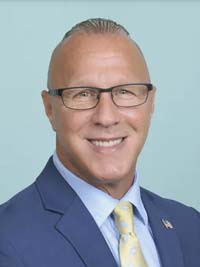Vincent Cavaleri of the Silent Majority Foundation addresses the effort to eliminate the Electoral College
Vincent Cavaleri
Silent Majority Foundation
Imagine a country where cities like Los Angeles, Chicago and New York could dictate every presidential election outcome before they happen. Sounds a bit out of left field, right? Well, that’s exactly what would happen if progressive Democrats had their way. Once again, a Republican wins the white house, so the democrats get right to work introducing legislation to eliminate the electoral college.

Senators Brian Schatz of Hawaii (D), Richard Durbin of Illinois (D) and Peter Welch of Vermont (D) have formally introduced a constitutional amendment to eliminate the electoral college, knowing full well that President Elect Donald J. Trump won this year’s popular vote by roughly seven million votes. The democrat senators were quoted as saying, “it’s time to restore democracy, by changing the presidential election to a national popular vote.”
Before I make the case for the necessity of the electoral college, let’s go back to 1787. The founding fathers, amidst the swirling winds of revolution, were stuck between their love for democracy and their fear of mob rule. In their infinite wisdom, they created the electoral college as a remedy and compromise. The electoral college was a way of saying we value everyone, and every geographical segment of the United States shall have an equal voice and equal representation.
The current system allocates electoral votes based on congressional representation, meaning every state receives a number of electors equal to its total number of senators and representatives. This process isn’t perfect, but it gives smaller states just as much relevance in the presidential electoral process.
America’s founders were true visionaries. They found a way to balance the interests of populous states with smaller ones. Ensuring that candidates or political parties couldn’t just focus their campaigns on the most densely populated urban centers. This allows states with fewer population to participate in shaping national policy. This was the genius and inclusivity of the founder’s remedy; they created equality across the states.
Only twice has a candidate won the presidency without winning the popular vote. George Bush in 2000, and Donald Trump in 2016, both republicans. For that reason, progressive democrats continue their futile endeavor, which has no chance of passing a two thirds majority in both houses of Congress. It’s also worth noting, calls for abolishing the electoral college have come exclusively from democrat legislators.
But let’s dig into the dangers of a popular vote for the nation’s highest office. The concept might seem appealing to some, but it carries significant risks. First, consider the sheer logistical nightmare of counting votes in a nation of over 330 million people. Now factor all 50 states utilizing their own constitutionally guaranteed methods of tabulating votes. The possibilities for corruption and manipulation would be endless.
Even more insidious is the potential for what some call majoritarian tyranny, or tyranny of the majority. This refers to a scenario in democratic governance where the interests of a simple majority population dominate all aspects of daily life. Sadly, we see this play out in cities like Chicago, New York, Los Angeles, and other entirely progressive run cities in America. One by one, each community slowly destroyed; and the minority voting block impoverished and irrelevant in perpetuity. Now imagine this chaos multiplied in all 50 states.
John Adams and James Madison both recognized the dangers of tyranny of the majority and took bold and decisive action to prevent it from happening. In the Federalist Papers, Madison opined how a domineering majority faction could take complete control of the government; and thus, the electoral college was born.
So, the next time you hear grumblings about the electoral college after an election cycle, take a moment to appreciate the brilliance behind it. Because if nothing else, it ensures that every state, from a bustling California to a sleepy Vermont, has a say in who takes the highest office in the land.
Vincent was honorably discharged from the United States Army Reserve in 1989 after serving 6 years and subsequently moved to Washington. He is currently a deputy with the Snohomish County Sheriff’s office and has been for over 22 years. Vincent is currently serving his second full City Council term in Mill Creek. Vincent and his wife Lilian have been married for over 32 years and they have two wonderful adult children. They welcomed their first grandchild in 2021.
Also read:
- Rep. Stephanie McClintock files three bills to improve student success in WashingtonRep. Stephanie McClintock files bills targeting mobile device use, student transfers, and teen work hours to enhance education and student success in Washington.
- Opinion: Prominent Democrats move to eliminate Electoral CollegeVincent Cavaleri of the Silent Majority Foundation defends the Electoral College, emphasizing its role in preserving democracy and equal representation.
- State Rep. David Stuebe sworn into Washington State House of Representatives, announces committee assignmentsState Rep. David Stuebe of Washougal begins his first term in the Washington State House of Representatives, joining key committees to serve the 17th District.
- Rep. John Ley sworn in as 18th District state representative, announces committee assignmentsRep. John Ley begins his first term representing the 18th District with key committee appointments in the Washington Legislature.
- Incoming Gov. Ferguson describes taxes as a ‘last resort’ for WA budget deficitGov.-elect Bob Ferguson emphasizes reduced spending over new taxes to address Washington’s $4 billion budget shortfall.










